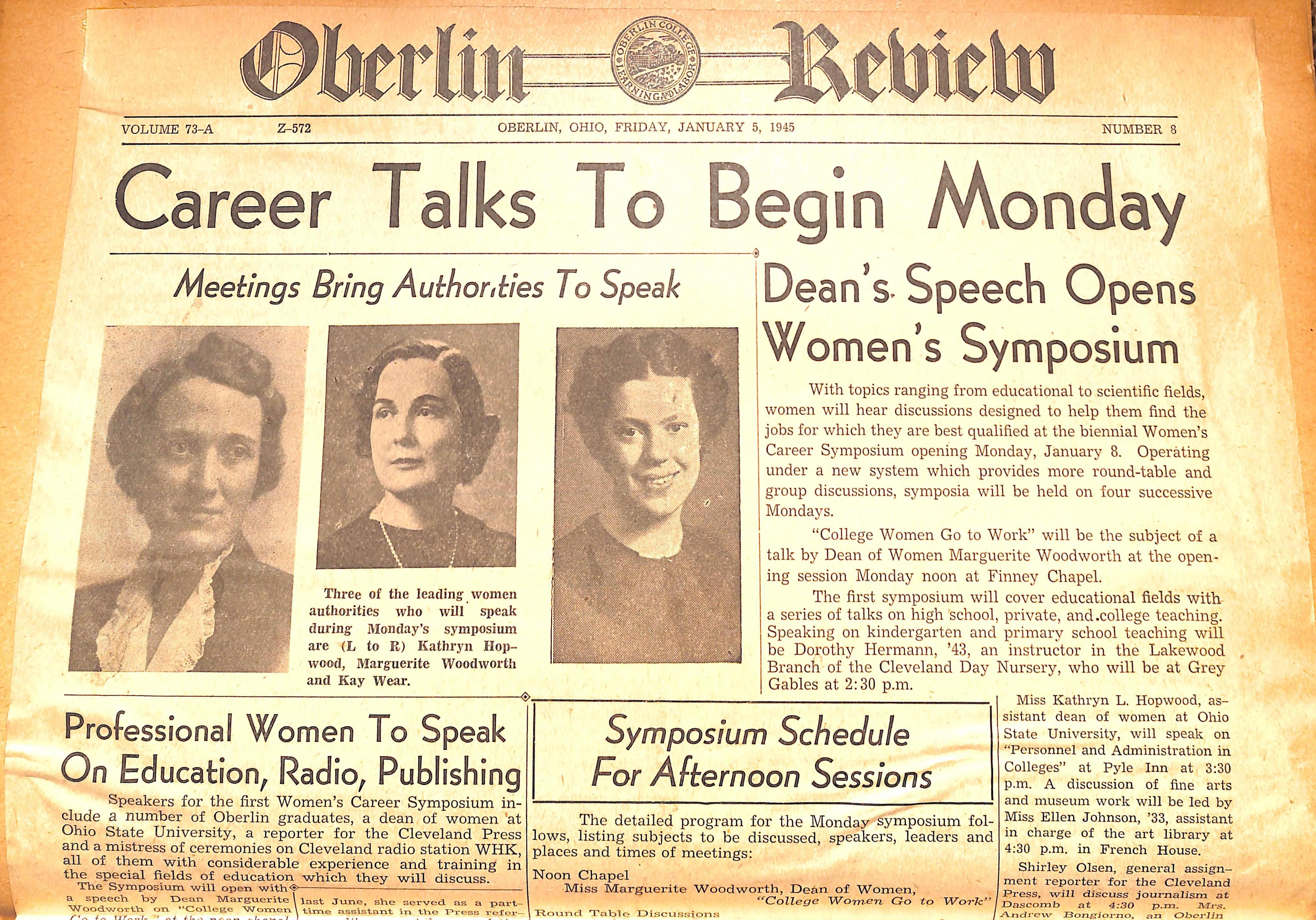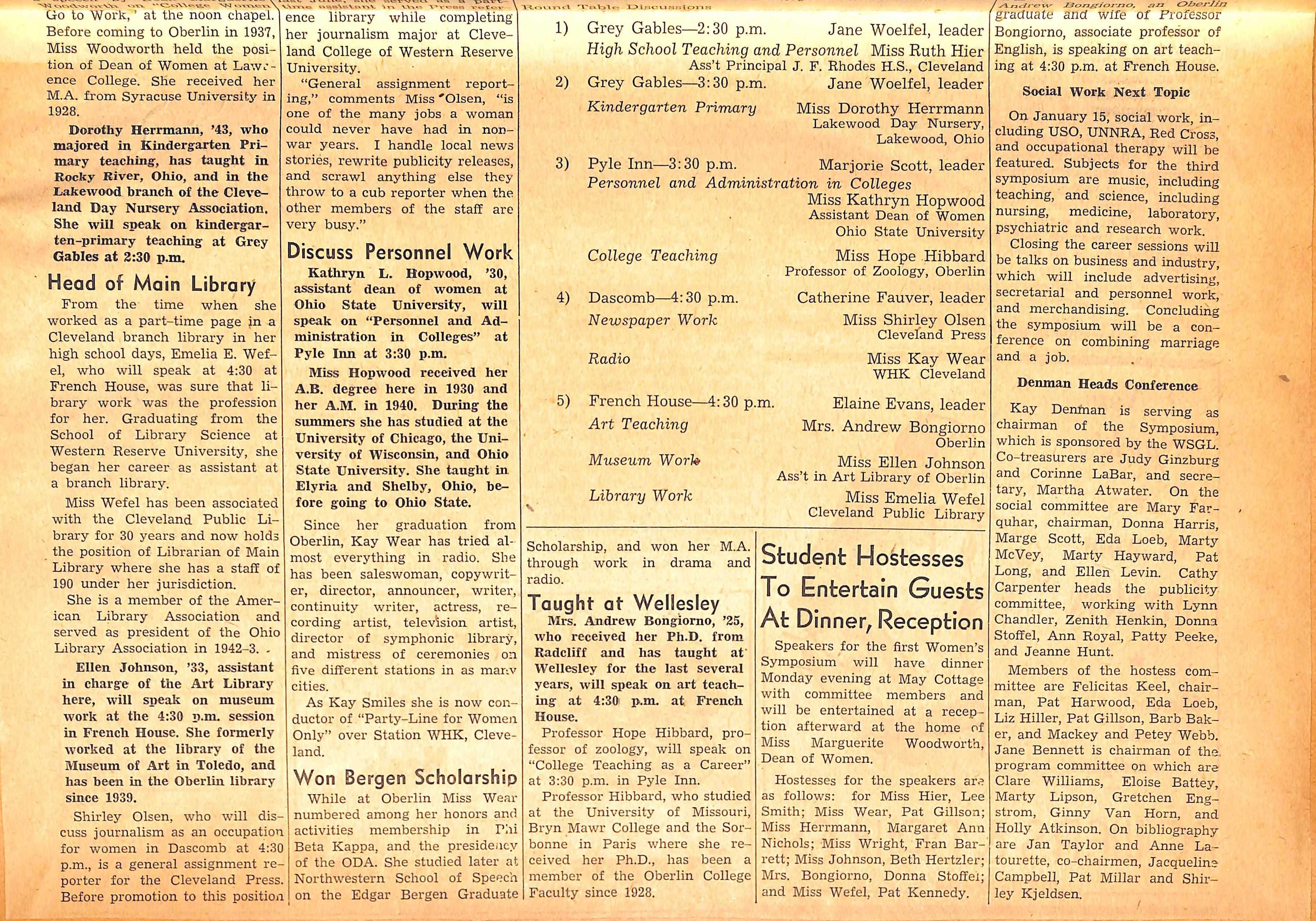|
|
Transcription: Oberlin Symposium On Occupations for Women January 8, 1945
NOON CHAPEL–“College Women Go to Work” Miss Marguerite Woodworth,[1] Dean of Women, Oberlin College
ROUND TABLE DISCUSSIONS
HIGH SCHOOL TEACHING AND PERSONNEL Miss Ruth Hier, Assistant Principal, J. F. Rhodes High School, Cleveland KINDERGARTEN PRIMARY Miss Dorothy Herrmann, Lakewood Day Nursery, Lakewood
PERSONNEL AND ADMINISTRATION IN COLLEGES Miss Katherine Hopwood, Assistant Dean of Women, Ohio State University COLLEGE TEACHING Miss Hope Hibbard,[2] Professor of Zoology, Oberlin College
PUBLISHING Miss Elsie Wright, World Publishing Co., Cleveland NEWSPAPER WORK Miss Shirley Olsen, city reporter, Cleveland Press RADIO Miss Kay Wear, WHK, Cleveland
ART TEACHING Mrs. Andrew Bongiorno,[3] former Associate Professor in the Art Department, Wellesley College MUSEUM WORK AND PRACTICAL ART Miss Ellen Johnson, assistant in charge of the art library, Oberlin College LIBRARY WORK Miss Emelia Wefel, librarian of the main library, Cleveland Public Library
Sponsored by the W. S. G. L.[4] Carol Kemper, president Kathleen Denman, chairman |
[1] Marguerite Woodworth was Dean of Women from 1937 to 1947. She published a pamphlet “Opportunities for Oberlin Women in War Time” on 6 February 1943. She outlined the various types of work women are “urgently needed in” such as teaching, social work, medicine, and nursing, and what types of majors and degrees they require.
In many ways, Woodworth impeded progress on interracial relations during this era. YW focused on creating “friendly” relationships between Black and white students because the College restricted those interactions and arrangements through housing policy. House directors and Deans often denied Black and white students the ability to room together, and “directors did not care to have more than two African American women students at a time lest a house be considered a dormitory for black students.” William Bigglestone, former Oberlin College archivist, wrote
“In 1943 [Woodworth] gave permission to black and white students to room together when asked. But she advised two counselors at Talcott, one black and the other white, who requested to do so, not to room together because she believed they would be more effective counselors if they roomed alone. The dean also tried to convince a white student, who was a close companion of two African American women students and who was dating an African American man, to make broader friendships, white and black. The concern stemmed mainly from the woman’s growing intimacy with the black male… But she was sensitive since Y. W. C. A. had been so critical of the advice given students by some of the house directors and she had told the directors to refer all matters of race relationships to her… On the other hand, the Y. W. C. A. had drawn up a statement of policy, that it asked the college to publish, explicitly saying that black and white students may room, date and dance together. The statement went unpublished.
The College’s rejection letter can be found in Document 11 (William E. Bigglestone, “Racial Progress at Oberlin College, 1940-1946,” Oberlin Heritage Center, accessed 29 July 2016, Source).
[2] Hope Hibbard (1894-1988) taught zoology at Oberlin College from 1928 to 1961, earning the Adeila A. Field Johnston Professorship in 1952. See Document 4 for a discussion of Hibbard’s feminist writing and activism, particularly her relationship to Oberlin YWCA.
[3] Laurine Elizabeth Mack (1903-1988) graduated Oberlin in 1925, earned a PhD from Radcliffe in Art History in 1930, and taught at Wellesley College. While a professor of art history at Oberlin, she worked with Allen Memorial Art Museum. She was married to Andrew Bongiorno, Professor of English (Oral History Prefaces, Oberlin Heritage Center, accessed 29 July 2016, Source).
[4] Women’s Self-Government League, a student organization active from 1944 to 1958.

